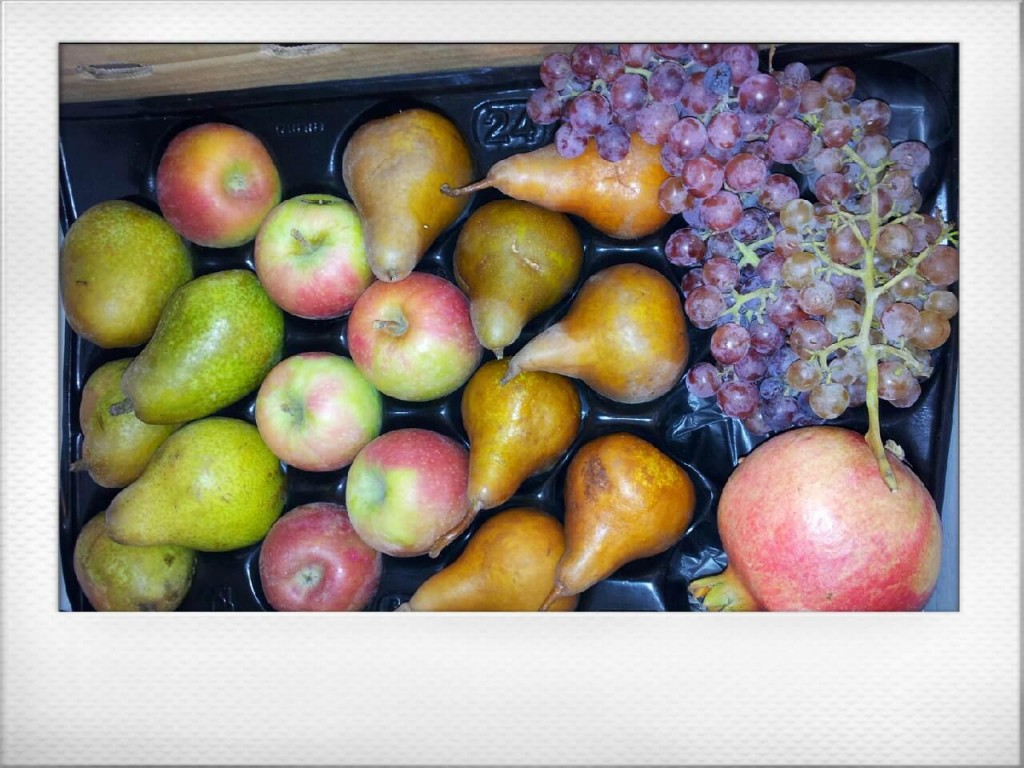This Week’s Fruit
Pomegranate
Native to the regions of Persia and the Western Himalayan range, pomegran- ates have been cultivated for several millennia. When sliced open a beautiful array of jewel like seeds are displayed. The aril is the colorful casing that sur- rounds the edible seeds and has a sweet tart flavor. Enjoy the arils alone or use them in salads, desserts, or beverages. Store these whole in the fridge or enjoy within 2-3 days if left on the counter.
Heirloom Apples
We grow a few varieties of heirloom apples, but not enough of each variety to pack everyone the same ones. You will receive some configuration of these varieties – Cox’s Orange Pippin, Ashmead’s Kernel, Belle de Boskopf, and Jonathon. Store on your counter out of direct light for 4-5 days. Refrigerate after to maintain crispness.
Warren Pears
This is Frog Hollow Farm’s signature pear and for good reason. Too difficult to grow for most farmers to consider it’s never caught on commercially but Farmer Al has never shied away from putting the time and effort into a fruit that tastes so good. It has a classic European texture, very soft and juicy with a silky sweetness that avoids the typical grittiness found in most pears. Ripe when wrinkled and yielding slightly near the stem. Pears will store well in the fridge once they have reached your optimal ripeness.
Golden Russet Bosc Pears
The Bosc was introduced to the US in 1836 and has also been known as the Kaiser Alexander. The Golden Russet is true to its name with a yellowish- white flesh and a uniformly russet skin. It has the classic Bosc shape of a long elegant neck. Excellent for cooking, the Bosc’s texture holds up very well in pies, tarts, and for poaching.
Flame Seedless Grapes
Firm, large, and sweet the Flame Seedless are one of the most popular varieties in North America. Enjoy these out of hand or try them in a variety of salads. Store in the crisper of your refrigerator or eat within 1-2 days from counter.
A Note From Maddie
(Farmer Al and Chef Becky’s Daughter)
Demeter & Persephone
The story of how the seasons were made or created is based on the Greek Myth of Demeter and Persephone. Demeter, the goddesss of agriculture had a daughter named Persephone. While Demeter farmed and dealt with the other Gods and Goddesses on Mt Olympus, Persephone was being taken care of by Nymphs. Persephone would play and pick flowers with the nymphs. One day, Persephone snuck away because a certain flower caught her attention. She tried to pick the flower but in an attempt to do so, she pulled all the roots out of the ground and Hades the God of Underworld, came out through the opening in his black chariot , grabbed Persephone and took her down into the underworld.
Demeter looked everywhere for Persephone. She asked every nymph and satyr where her daughter was but no one knew. Then, Demeter came across a river nymph and asked her if she had seen her daughter. The nymph said that she had seen Hades grab Persephone and take her down into the Underworld. Demeter became so sad and angry that she refused to let anything grow on the Earth. Zeus begged Demeter to make the Earth green again but she refused to do so until she could get her daughter back.
In the underworld, Persephone was sad all the time because she missed her Mother and the sunshine and the flowers. Zeus told Hades that he had to give Persephone back to Demeter. Hades solemnly agreed but just as Perse- phone was leaving the underworld, Hades offered her pomegranate seeds. She was hungry as she had not eaten during her time in the underworld. As she ate them, she dripped pomegranate juice onto her dress. As she rose out the underworld, Zeus noticed the juice that had stained her dress. Zeus real- ized that she could not come out as she had eaten the food of the dead. Zeus couldn’t let his people starve to death but he couldn’t let Persephone leave either. He decided that she would have to stay with Hades half the year and be above the Earth with her Mother the other half. When Persephone is with Hades in the underworld, Demeter is sad and so the earth is barren becoming Fall and Winter. When she returns, Demeter is happy earth turns to Spring and Summer; the flowers bloom and crops grow and ripen. That is how the seasons were created.

 Follow
Follow

